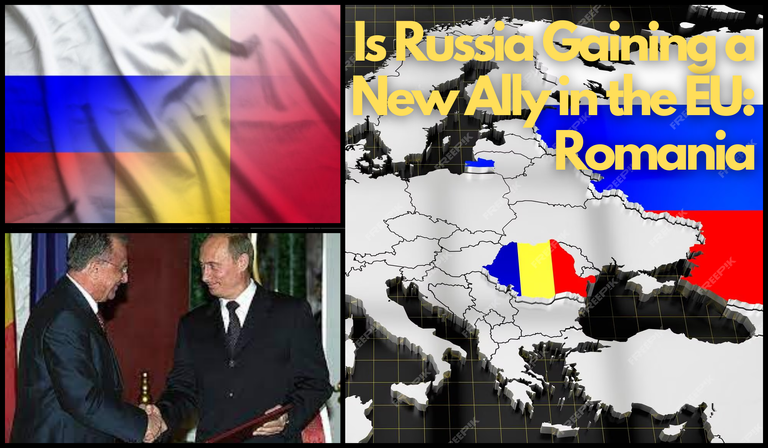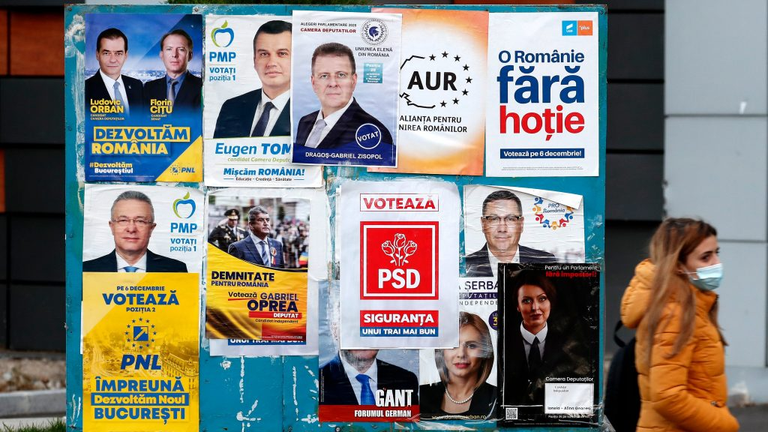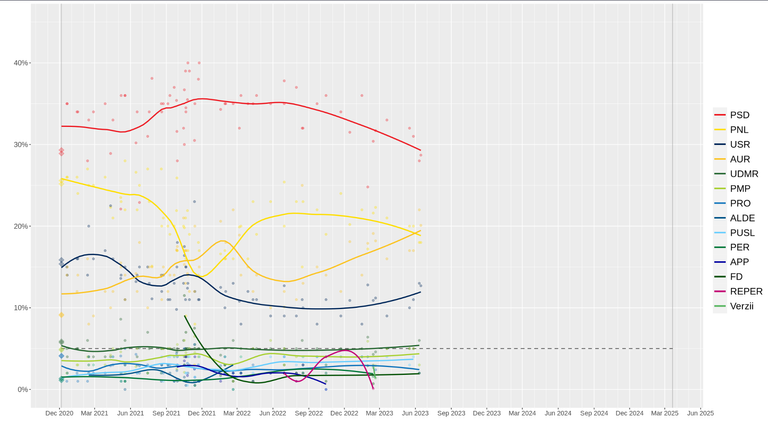
On October the 10th, Ukrainian President Vladimir Zelensky visited Romania to negotiate for further support of its war effort. Romania has been solidly pro-ukraine since the start of Russia's invasion of the country, supplying regular military aid and even setting up a training center for prospective Ukrainian F-16 pilots. Despite this solid track record, Zelensky's visit didn't go as planned, with the Ukrainian president canceling his speech in front of the Romanian parliament in anticipation of Anti-ukraine protests by the ultra nationalist Alliance for the Union of Romanians or AUR for short. AUR only one a handful of seats in the Romanian parliament at the 2020 election but they've been surging in the polls recently, and one poll put them ahead of both Romania's establishment parties ahead of the upcoming European elections. AUR has been described as anti-EU and anti-nato with isolationist and traditionalist instincts, and they're the latest in a string of right wing nationalist parties popping up across Europe. So in this article we're going to have a look at the our who they are and why, even if they're unlikely to take power any time soon, their surging popularity could nonetheless indirectly influence Romanian policy.
In the past three years since its last election, Romania has sifted through an impressive three prime ministers. Now, changes in office aren't uncommon in Romania. After overthrowing and subsequently executing its hardline communist dictator Nicolae Ceaușescu in 1989, Romania has gone through 25 different governments, which averages out at about a new government every 15 months. For most of Romania's post Ceaușescu history, its politics have been dominated by the center left Social Democratic Party, which was founded by former members of the Communist Party. Its main opposition has been the center right National Liberal Party, which governed in coalition with the Soviet Democrats as the Social Liberal Union in the early 2010s. Anyway, these two parties continue to dominate to this day and are currently in a grand coalition agreement after neither party won an outright majority at the 2020 parliamentary elections. The government is led by Social Democratic leader Marcel Ciolacu, who took over from National Liberal Party leader Nicolae Ciucă earlier this year as per their coalition agreement. Now, it should also be noted that Romania is actually a semi-presidential republic, and President Klaus Iohannis, a former member of the National Liberal Party played a key role in negotiating this grand coalition, which he hoped would provide political stability. Unfortunately for the coalition, that's not how things have panned out. Like many developing countries, the Romanian economy has had a torrid few years with the pandemic and the war related disruption to European energy supplies, which the government has struggled to get a handle on.

On top of that, the Social Democrats have been involved in a number of major corruption scandals, but the president has effectively allowed them to govern the country regardless. Unsurprised, this situation has provided the perfect opportunity for protest parties to rally disenchanted voters. Enter AUR a far right party founded and led by 37 year old political activist George Simion. Years before joining politics, Simion focused on rallying support for the reunification of Moldova with Romania, organizing marches in support of uniting the two countries and even facing deportation from Moldova as a result. In 2019, he founded AUR meaning gold in Romanian. The party gained traction ahead of the 2020 election, where it won 9% of the vote, seemingly out of nowhere. The party pushed its irredentist message and also campaigned on its strong stance against gay marriage and Covid restrictions. It has strong ties to the Romanian Orthodox Church and even gained large support from the Romanian diaspora living abroad. AUR Covid skeptic rhetoric apparently went down well in Romania, where only 41% of adults were vaccinated by the end of the pandemic. This is a familiar pattern in Europe, Grand coalitions seem to disenfranchise voters on both ends of the political spectrum, providing electoral fuel for anti-establishment parties.
Since then, Simion has shifted the party to focus more on the war in Ukraine. He's advocated for stopping all military aid to Ukraine, and heavily criticized the government for allowing importation of cheaper grain from Ukraine and its transit through Romania. As a result of this and his greater Romanian irredentism, Simion has been banned from entering Ukraine as well as Moldova. Now I should say here that Simion insists he's not at all pro-Russia, and a leading AUR member told the Financial Times earlier this month simply that Romanians have suffered both from Ukrainians and from Russians and we don't actually like either of them much. Nonetheless, reducing support for Ukraine would clearly be to Russia's advantage, if even indirectly. Not least because Romania plays a vital role as a transit state for aid to Ukraine. To improve its mainstream appeal the party has also moderated its rhetoric. For example, our used to attack Romania's Hungarian majority, but has recently dropped its anti-hungarian talking points and instead points to Viktor Orban as a regional role model. To dispel accusations of anti-Semitism Simion met with Israel's ambassador to Romania to acknowledge Romania's role in the Holocaust and expressed support for Israeli settlements in Palestine. Simion has even U-turned on his anti-vax stances, saying that he had had his children vaccinated against Covid, which provoked one of his members to leave AUR and form a new nationalist outfit, SOS, which hovers in the polls at just around the 5% needed to enter Parliament.

So what does all this mean for a. Political future? First of all, despite AUR rise in support, Prime Minister Ciolacu has said he will continue supplying multidimensional aid to Ukraine regardless of the political costs and the general war fatigue felt within the EU as a whole. It's also worth noting that while Romania did cancel Zelensky's speech after his visit, the Romanian government still announced a strategic partnership between Romania and Ukraine. Similarly, while support for AUR is obviously increasing, the party is a long way from unseating the governing coalition or being able to directly affect policy. In the upcoming presidential elections scheduled for November this year Simeon polls third with 19%, well behind independent candidate Mircea Geoana, who currently serves as deputy secretary general of NATO and is in the lead with 27%. However, while AUR might still be a long way from government, if their popularity grows, they still might be able to indirectly influence Romanian policy. More mainstream political parties like the center right National Liberal Party might move further to the right in an attempt to regain some of their old voters, who've since switched to the hour.
We saw something similar in Poland when the rise of the far right Confederation Party pushed the incumbent Law and Justice party into taking a harder line on immigration and Ukrainian grain exports, which Confederation opposed on the grounds that they were undercutting Polish farmers. Their first real electoral test will come at the EU elections in June, and if they outperform expectations, we might see mainstream parties shifting towards AUR policy on certain issues. Slowing economic growth and high inflation still offer fertile ground for AUR.